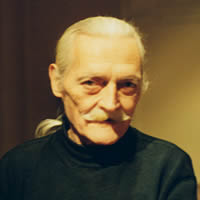La Folia Lost a Dear Companion
|
[July 2004.]
My friendship with William Andrew Grieve-Smith began with a letter he sent in response to something I wrote in my Fanfare column about CD players. Put that at close to 20 years ago. It was a friendly letter, setting it apart from a lot of the mail that came my way in those days. Grieve (which is what he liked to be called) visited my place and I his a number of times to listen to recordings. (I lived then in Brooklyn’s Park Slope and he on Manhattan’s Upper West Side.) He was, and remained, a hard-bitten audiophile. But a strange one. I know of few self-professed (or self-confessed) audiophiles who can lay claim to a scholarly expertise with respect to the discs they like to play. Grieve’s knowledge of pipe organs and their literature, along with English liturgical music of centuries past — including comments on mispronunciations! — struck me as so all-encompassing, I suspected that he might have been making at least some of it up. I learned more than once that he wasn’t. I’ve remained astonished at how much Grieve knew about so many things. A lot of regret resides in knew. With a dear and good fellow perished a storehouse of knowledge. It’s too late now of course, but I do wish he had thought to put more of it down on the page or on the video screen. But our wide-ranging conversations, mostly by phone, will always be with me. He had some funny stories to tell, a few of which he agreed to write about. They’re in our Archives, along with his music reviews. Grieve loved to talk about the odd moments, beginning in Texas, which he couldn’t vacate fast enough. A proud son of the Lone Star State he was most assuredly not. When Grieve and I first got together, I believe he was still working as a recording engineer, largely on the advertising side of the line, or had only recently given that up. He also did some work for young, independent filmmakers, which he found less and less satisfactory: crazy-long hours, crazy-low pay, and the truckload of hardware he was expected to provide. Ultimately, he gave up accepting freelance assignments. After a longish hand-to-mouth stretch, Grieve secured a berth teaching sound at NYU’s film school. In the matter of affection, his stories about the institution approximate those of his native soil. Indeed, my friend could be less than charitable, but he had a way of sheathing his curmudgeonly utterances in an acerb and absurdist humor. He got a kick out of making people laugh. It will surprise no one that Grieve admired W.C. Fields. His flair for silly names and screwball Latin mottoes closed ever so many of his amusing emails. However, if I ever needed to clear up a point of bona fide Latin, he was my authority. I knew that Grieve was in delicate health. There was a time when he was hospitalized that I thought he had died — and was mightily relieved to learn otherwise, from the man himself. The shock of his death comes mostly from Grieve’s having convinced me in several emails that his condition, while troublesome, was slowly improving. I’ll miss you, Grieve. Mike Silverton * * * Living on the Left Coast, my contact with Grieve was limited to emails and trading CDs. His interests (laid out in his debut) fell “chiefly in the time between 1500 and 1750.” This clicked with the larger part of my own, and a lively correspondence ensued. He carried an immense fund of knowledge lightly, and generously shared it. (I can’t recall mentioning a European organ he hadn’t heard in person.) Music I felt I knew (Byrd, Schütz, Biber) was enriched by his understanding. I’d also point to his memoir-style entries, as representative of his wide experience and joyous wit. I shall miss him a lot. Figures he touted (Buxtehude, Sweelinck, Tallis) will be difficult to hear without imagining him in the room, and I long to get his take on a new item like Robin Blaze’s Byrd Consort Songs on Hyperion. But I’m grateful for the last four years. A rare and irreplaceable spirit. Walt Mundkowsky * * * As La Folia’s youngest and most narrowly experienced staffer, I’ve absorbed Grieve’s articles as richly illustrated guidebooks for unfamiliar spas. Our email exchanges, which he signed off “<grnpa>,” were mostly about business. I learned over time and to my delight that his photographic memory contained a rich treasury of ungrandfatherly information. I’m still trying to process his effortless comments on the Wittgenstein family for a perpetually in-progress article. I’ll miss his liveliness, and am very sad, perhaps selfishly, that his La Folia itinerary is finite. Grant Chu Covell
[Previous Article:
Copland and Me: Two Concerts and a Recording]
[Next Article:
Two ECM Beauties: Holliger and Lachenmann]
|
